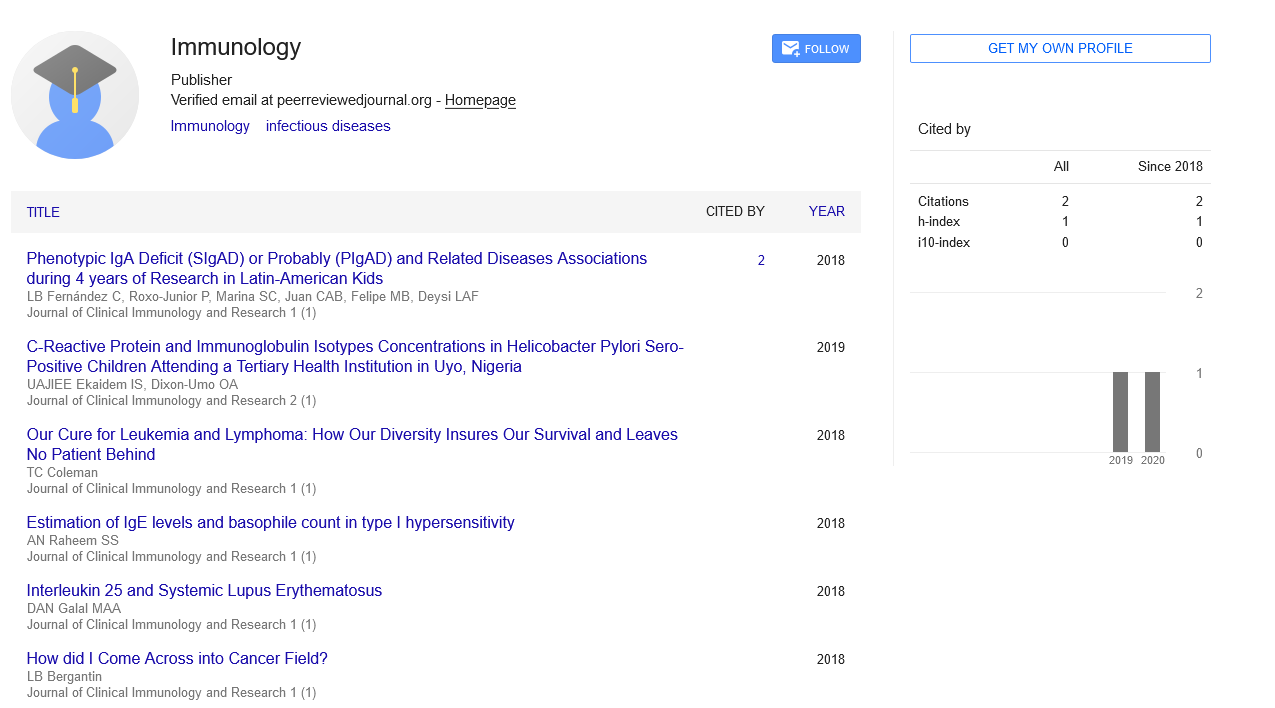Perspective, J Clin Immunol Res Vol: 6 Issue: 2
Immunodeficiency Caused by Weak Immune Systems
Adriel Rezaei*
1Department of Human Genetics, Lebanese American University, Byblos, Lebanon
*Corresponding Author: Adriel Rezaei,
Department of Human Genetics,
Lebanese American University, Byblos, Lebanon
E-mail: rezaeiadriel@gmail.com
Received date: 15 May, 2023, Manuscript No. JCIR-23-104723;
Editor assigned date: 17 May, 2023, PreQC No JCIR-23-104723 (PQ);
Reviewed date: 01 June, 2023, QC No. JCIR-23-104723;
Revised date: 08 June, 2023, Manuscript No JCIR-23-104723 (R);
Published date: 16 June, 2023, DOI: 10.4172/JCIR.100080
Citation: Rezaei A (2023) Immunodeficiency Caused by Weak Immune Systems. J Clin Immunol Res 6:2.
Abstract
Description
The immune system serves as a vital defense mechanism against infections and diseases, constantly working to keep our bodies healthy. However, in some individuals, the immune system may be compromised, leading to immunodeficiencies. Immunodeficiencies are conditions characterized by a weakened or impaired immune response, making individuals more susceptible to infections and other health complications.
Primary immunodeficiencies
Primary immunodeficiencies are inherited disorders that result from genetic mutations affecting various components of the immune system. These mutations can affect B cells, T cells, phagocytes, complement proteins, or other immune cells and molecules. Primary immunodeficiencies often manifest in childhood or early adulthood and may present with recurrent or severe infections, poor growth, and other immune-related symptoms.
Secondary immunodeficiencies
Secondary immunodeficiencies, also known as acquired immunodeficiencies, occur as a result of external factors that impair the immune system. These factors can include infections, certain medications (such as immunosuppressive drugs), chemotherapy, malnutrition, chronic diseases (such as diabetes or kidney disease), or aging. Secondary immunodeficiencies can develop at any age and are often reversible once the underlying cause is addressed.
Common immunodeficiency and their causes
There are several well-known immunodeficiency disorders, each with its own causes and manifestations. For example, X-linked Agammaglobulinemia (XLA) is caused by a mutation in the gene responsible for B cell development, leading to a lack of functional antibodies. Severe Combined Immunodeficiency (SCID), often referred to as "bubble boy disease," results from defects in multiple immune cell types, leading to a severely compromised immune system.
Symptoms and complications of immunodeficiency
Immunodeficiency can present with a range of symptoms and complications. Recurrent or severe infections, including respiratory tract infections, skin infections, and fungal infections, are common features. Delayed wound healing, gastrointestinal problems, autoimmune disorders, and increased susceptibility to certain types of cancer may also be observed in individuals with immunodeficiencies.
Diagnosis and treatment options
The diagnosis of immunodeficiencies involves a thorough evaluation of medical history, physical examination, and laboratory tests to assess immune system function. These tests may include complete blood counts, immunoglobulin levels, lymphocyte subset analysis, and genetic testing.
Treatment approaches for immunodeficiencies aim to manage symptoms, prevent infections, and improve overall immune function. Depending on the specific immunodeficiency, treatment options may include immunoglobulin replacement therapy, prophylactic antibiotics, antiviral medications, hematopoietic stem cell transplantation, gene therapy, or targeted therapies for specific genetic defects.
Treatment approaches for immunodeficiencies aim to manage symptoms, prevent infections, and improve overall immune function. Depending on the specific immunodeficiency, treatment options may include immunoglobulin replacement therapy, prophylactic antibiotics, antiviral medications, hematopoietic stem cell transplantation, gene therapy, or targeted therapies for specific genetic defects.
Living with an immunodeficiency
Living with an immunodeficiency can present unique challenges. Individuals with compromised immune systems may need to take extra precautions to avoid infections, such as practicing good hygiene, receiving vaccinations, and avoiding contact with sick individuals. Regular medical follow-ups, a healthy lifestyle, and a supportive network are essential for managing immunodeficiencies and maintaining overall well-being.
Conclusion
Immunodeficiencies encompass a diverse group of disorders that can significantly impact the body's ability to fight infections and maintain health. Whether they are primary or secondary, understanding the causes, symptoms, and available treatments for immunodeficiencies is important for proper diagnosis and management. Ongoing research and advancements in genetic testing, immune therapies, and targeted treatments hold promise for improving the quality of life for individuals with immunodeficiencies. With early detection, appropriate medical care, and a supportive environment, individuals with immunodeficiencies can lead fulfilling lives and minimize the impact of their condition on their overall health.
 Spanish
Spanish  Chinese
Chinese  Russian
Russian  German
German  French
French  Japanese
Japanese  Portuguese
Portuguese  Hindi
Hindi 